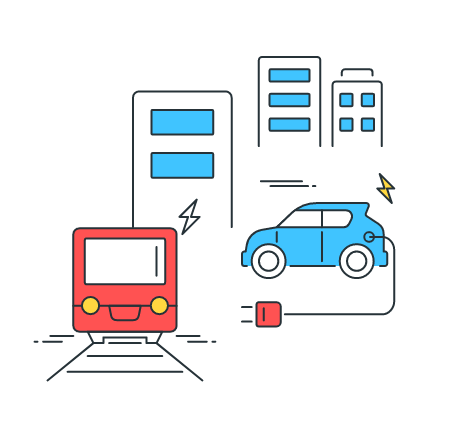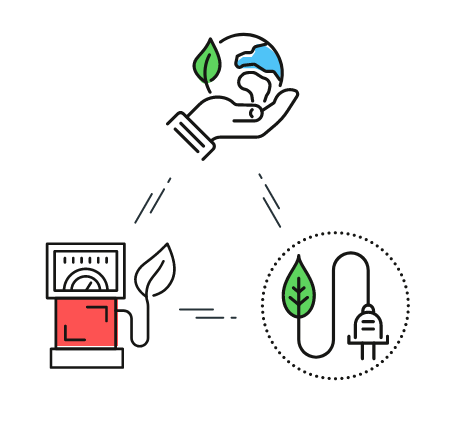Actions overview
- Enable, inform and support the efficient urban transformation of cities.
- Deploy wide-scale demonstration of innovative technologies.
- Roll out an extensive monitoring and evaluation programme.
- Implement community engagement actions.
- Replicate demonstrated smart and integrated lighthouse city solutions.
- Generate a bold vision in line with the new EU climate and energy strategy.
- Pro-actively cooperate with other Smart Cities and Communities projects funded under Horizon 2020.
- Support the development of competitive new services, business models and financing instruments.
- Actively and efficiently promote the SPARCS project and its outcomes at local and European level.
1. Enable, inform and support the efficient urban transformation of cities.
SPARCS will enable, inform and support the efficient urban transformation of cities into carbon free societies including, especially, smart networks, low carbon transport solutions, a sustainable energy transition, and improved air quality.

Objectives
- Demonstration of 5 energy positive blocks and 5 districts in Espoo and Leipzig;
- Integrated smart energy solutions and systems including a virtual power plant, integration options for renewables, district level energy solutions, large battery and storage applications, and others;
- Interoperable digitalisation solutions including big data optimisation and adaptation of blockchain technology;
- Electro-mobility integration and technologies including the integration of EV-charging to the local grid, peak load monitoring and control, community and residential EV-parking solutions, EV as storage and other aspects;
- Energy-positive urban district planning and governance models, including new procurement and co-creation models and new mechanisms for networked urban development.
2. Deploy wide-scale demonstration of innovative technologies
SPARCS will deploy a demonstration of innovative technologies for integrated, mixed-use, positive energy building blocks in the 2 lighthouse cities, Espoo and Leipzig, and selected feasibility tests in 5 fellow cities. These interventions in the 7 cities cover.

Objectives
- Develop a holistic, advanced, qualitative and quantitative diagnosis of current city challenges to support SPARCS interventions and the development of a bold City Vision 2050;
- Integrated smart energy solutions and systems including a virtual power plant, integration options for renewables, district level energy solutions, large battery and storage applications, and others;
- Interoperable digitalisation solutions including big data optimisation and adaptation of blockchain technology;
- Electro-mobility integration and technologies including the integration of EV-charging to the local grid, peak load monitoring and control, community and residential EV-parking solutions, EV as storage and other aspects;
- Energy-positive urban district planning and governance models, including new procurement and co-creation models and new mechanisms for networked urban development.
3. Roll out an extensive monitoring and evaluation programme
SPARCS will roll out an extensive monitoring and evaluation programme with associated Key Performance Indicators, for the holistic assessment of SPARCS interventions. SPARCS monitors the performance of deployed solutions and incorporates this data into the Smart Cities Information System (SCIS). The monitoring and evaluation programme is enabled by the following objectives

Objectives
- A methodology and KPIs for holistic monitoring and impact assessment of SPARCs interventions;
- Thorough ex-ante evaluation of the cities baseline, enabling an objective assessment of the impacts of SPARCS interventions;
- Launching and performing a data gathering programme of at least 2 years per intervention and creating an open data repository for continuous monitoring of the evolution of the project’s impact;
- Impact assessment validation of SPARCS solutions including socio-economic, environmental and technological aspects, as well as air quality.
4. Implement community engagement actions
Implement community engagement actions and promote a citizen-centric approach for enabling inclusive, integrated, and sustainable urban development, planning and management practices and governance models. SPARCS increases community ownership of smart solutions and fosters inclusive smart city development through a transdisciplinary community engagement strategy that targets the following objectives.

Objectives
- Active involvement of city stakeholders and citizens at all stages of project implementation, aimed at democratising energy transformation and increasing acceptance among citizens;
- Design and deployment of citizen-centric services, placing humans at the centre of the energy transformation of cities and equipping them with cutting edge technologies and intuitive personalised services and applications;
- Building citizens trust in local governments and encouraging their involvement in local action, by delivering concrete and bankable replication plans accompanied by open and participatory governance and viable business models.
5. Replicate demonstrated smart and integrated lighthouse city solutions
Replicate demonstrated smart and integrated lighthouse city solutions in fellow cities and lay the foundations for European-wide adoption and upscaling. SPARCS drives technological progress and deployment by supporting the systematic adaptation, replication and upscaling of integrated lighthouse city solutions.

Objectives
- Develop structured, inclusive and targeted fellow city implementation plans in all 5 fellow cities;
- Collect all implemented lighthouse city use cases in a structured format to be communicated to fellow cities and made freely accessible on the internet;
- Educate certified Smart City Managers in each fellow city to enable effective and efficient implementation during and after the project;
- Develop and execute robust and structured knowledge transfer mechanisms and prepare the implementation and upscaling of positive energy block solutions;
- Identify opportunities for further transferability, large scale replication and implementation of demonstrated solutions and pilot joint cross border procurement of innovation with at least 2 cities.
6. Generate a bold vision in line with the new EU climate and energy strategy.
Generate a bold City Vision 2050 in line with the new EU carbon neutrality climate and energy strategy. SPARCS is developing a shared bold City Vision 2050 as a co-creation process between cities, industry, innovative SMEs, entrepreneurs and citizens, for each lighthouse and fellow city. This vision will cover the urban, technical, financial and social aspects of transition and include a roadmap on planning, implementation, replication and scale-up of successful smart-city solutions. To reach this objective SPARCs will:

Objectives
- Set high-level strategic ambitions based on a thorough city diagnosis and develop a comprehensive understanding of the drivers for change;
- Set up a participatory methodology allowing for the development of the Roadmap for Urban Transformation;
- Involve local stakeholders in each city in an on-site strategic week, ensuring the development of a vision that is truly embedded in each city’s specific context;
- Foster the creation of urban environments in which automated, multi-modal and on-demand mobility systems are integrated, promoting the transition towards a green Circular Economy.
7. Pro-actively cooperate with other Smart Cities and Communities projects funded under Horizon 2020
Pro-actively cooperate with other Smart Cities and Communities projects funded under Horizon 2020, the European Innovation Partnership on Smart Cities and Communities (EIP-SCC) and other relevant projects, networks and initiatives. This action also aims to create joint recommendations to maximise the impact, replication, and scale-up of smart city solutions and to ensure efficient knowledge exchange.

Objectives
- Horizontal collaboration with other Smart City projects to increase synergies, share experiences and transfer knowledge;
- Facilitating networking between the 77+ lighthouse city projects;
- Cooperation with cross-cutting initiatives like the Covenant of Mayors and EIP-SCC Marketplace clusters.
8. Support the development of competitive new services, business models and financing instruments
Support the development of competitive new services, business models and financing instruments for sustainable, forerunner energy positive smart districts, and the creation of business ecosystems. SPARCS ensures the sustainability and future use of project results and demonstrated solutions by fostering innovative and integrated governance and business models.

Objectives
- Identifying proven successful smart city business models and financing schemes;
- Promoting targeted and efficient smart city investments;
- Supporting continued access to new and emerging innovative technologies and systems;
- Fostering smart city business ecosystems and planning a commercialisation route for SPARCS solutions;
- Identifying needs for services in cities and supporting the development of new services and start-ups;
- Defining and implementing agile participatory governance models for participating cities.
9. Actively and efficiently promote the SPARCS project and its outcomes at local and European level
Actively and efficiently promote the SPARCS project and its outcomes at local and European levels, raise awareness of the European smart city concept, and support wide-spread knowledge sharing across solutions. SPARCS is creating impact with a targeted communication and dissemination strategy, and efficient, engaging communication actions by:

Objectives
- Creating an integrated, online knowledge sharing platform and developing online and offline communication tools;
- Coordinating workshops, events and other dissemination and communication efforts across cities, SCC projects and initiatives;
- Supporting local city-level events and promoting a citizen-centric approach across all stages of the project;
- Utilizing existing local initiatives such as the Six City (6Aika) cooperation in Finland and enabling internal and external knowledge sharing across solutions;
- Supporting global development towards reaching the UN Agenda 2030 goals, through the UN SDG City initiative, with Espoo nominated as one of 25 pioneering cities.
